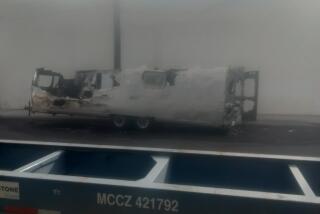Crime Pays Upon Sale of Confiscated Equipment
- Share via
TULARE, Calif. — The city of Tulare is reaping the rewards of a federal law that allows municipalities and law enforcement agencies to keep equipment seized in criminal investigations.
The most recent incident involved the sale of a Cessna 210 airplane that brought the city $30,000.
The city took title to the airplane in January, 1985, after its pilot ran off a runway while making an unauthorized late-night landing at Mefford Field, then abandoned the plane and its $30-million cargo of cocaine.
City Manager Lynn Dredge said the plane was worth about $45,000 new and originally city officials wanted to keep it.
“We could use a plane for public purposes but we found the confiscated craft was a bit more sophisticated than the city needed,” Dredge said. “So we decided to sell it and use the money to buy a smaller, less sophisticated plane that would fit the city’s needs.”
More than two years ago, the city became the owner of a replica Shelby Cobra sports car when authorities arrested a former city maintenance yard superintendent who was found to have used city funds to buy it.
He said the money from the sports car sale, about $20,000, went into the city’s general fund.
“We think the city lost about $85,000 to the maintenance manager, John Babcock, so we took a beating on that case even though we sold the sports car kit,” Dredge said.
Babcock was killed late last year in a traffic accident while out on bail pending an appeal of his conviction on embezzlement charges, so the city doesn’t have much chance of recovering the rest of the money he was convicted of stealing.
The airplane and the car were two of the more exotic pieces of equipment seized under the confiscation program, but there have been other, less valuable, objects.
“Sometimes we get an old beat up car or something like that,” Dredge said. “Often the thing confiscated isn’t worth very much but every little bit helps.”
More to Read
Sign up for Essential California
The most important California stories and recommendations in your inbox every morning.
You may occasionally receive promotional content from the Los Angeles Times.













